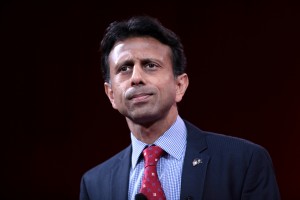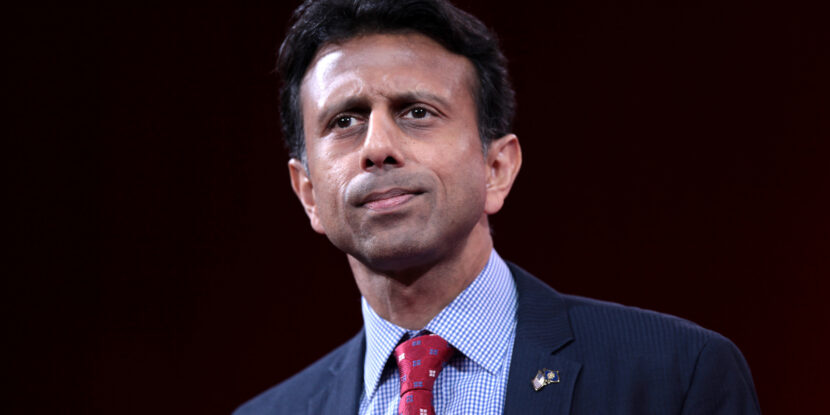In our Common Core report card, we graded Bobby Jindal and all of the GOP candidates based on the three following criteria: fighting the Common Core, protecting state and local decision-making on education, and defending child and family privacy. Then we averaged the three grades together for one final grade.
What does each grade mean?
A … Champions the issue, e.g., offers legislation, makes it a centerpiece issue.
B … Professes support, but has not provided leadership or otherwise championed it.
C … Has neither helped nor hurt the cause.
D … Has an overall negative record on the issue.
F … Robustly and consistently works against the issue.
So how did Bobby Jindal do?
Ending the Common Core System: B+
Protecting State and Local Decision Making: B+
Protecting Child and Family Privacy: A-

Overall Grade: B+
Like many governors, Gov. Bobby Jindal was initially in favor of the Common Core Standards. However, more recently, Jindal has made the repeal of the Standards a key issue. Jindal has gone on record with his assertion that “[t]he federal government has hijacked and destroyed the Common Core initiative.” (Of course, the idea that the Standards were ever truly in the hands of the states is a myth.) Back in February, Jindal released a 42-page plan on Education. That plan addresses many education issues and is notable, in several respects, to the Common Core issues. In it, Jindal raises the quality of the Common Core, something that most presidential candidates assiduously avoid. He also pinpoints a pervasive cause of policy dysfunction in American education:
[T]he rollout and unraveling of [the Common Core] national initiative has made it abundantly clear that the U.S. education establishment too often does not respond to parents and local voters. Instead, federal mandates, money, and threats bend officials’ necks stiffly towards Washington.
In his plan, he also notes that Common Core disenfranchises parents because private entities drafted it through a private process that lacks the safeguards of a public process (e.g., open meetings, record requests) through which neither the people nor their elected representatives had a real say in the substance, and because the Common Core inserts itself between parent and child by promoting bad instructional practices (e.g., experimental math). And in it, he takes a firm stance on data and privacy issues.
In the most recent (2015) legislative session, he favored a strong repeal bill. A compromise bill made it through the legislature which, in the end, Jindal supported.
Jindal was an early supporter of Common Core. But in 2014, he come out swinging against it, although he occasionally lapses into a narrative that it was the federal involvement that made it bad. He supported legislation to rid his state of Common Core. He has also sued USED in federal court on the grounds that the Department’s Race to the Top programs was coercive, violates federal law, and is contrary to the Constitution.136 Jindal stumbled out of the gate on Common Core, but he has righted himself and has admirably pushed back against the federal overreach.
Jindal also has been very strong in trying to get Louisiana out of PARCC-like testing (which would limit their data collection). He has issued executive orders, fought in lawsuits, and this year severely restricted the state Department of Education’s with regard to the scope and length of its new testing contract.
On June 4, 2014, Jindal signed HB 1199 (Act 436), which provides for parental access to instructional materials in public schools and requires information about such access to be included in parent orientation sessions.
On June 18, 2014, Jindal signed HB 1283 (Act 677), which provides for transparency as to agreements made by public education agencies regarding the sharing of personally identifiable student information.
On June 18, 2014, Jindal signed SB 312 (Act 699), the “Parent’s Bill of Rights,” which enumerates the rights of parents with public school children relative to their child’s education. It includes nine enumerated rights that parents of public school children are afforded, including but not limited to the right to: examine textbooks, curriculum, and supplemental material used in their child’s classroom; inspect their child’s school records; be notified if a criminal action is deemed to have been committed against their child or by their child; be notified if law enforcement personnel question their child; be notified if their child is taken or removed from the school campus without parental permission; and receive written notice and have the option to opt their child out of instruction on topics associated with sexual activity.
On June 23, 2014, Jindal signed HB 1076 (Act 837), which prohibits the state from procuring information from the student or the student’s family concerning political affiliation, mental health, sexual behavior, income, and gun ownership, among other things, without their personal consent. Not even the state education department will be allowed to see or keep personal data on the state’s students. Students’ names, addresses, and other information will be kept only at the local school district level.
As with other candidates, it would be good for Jindal to detail his proposals for limiting federal overreach in education. We think that, like Perry, Jindal should boldly proclaim his record of fighting federal intrusion.
Jindal is a sitting governor. We hope that he continues his engagement in the Cause in Louisiana even as he runs for president.


